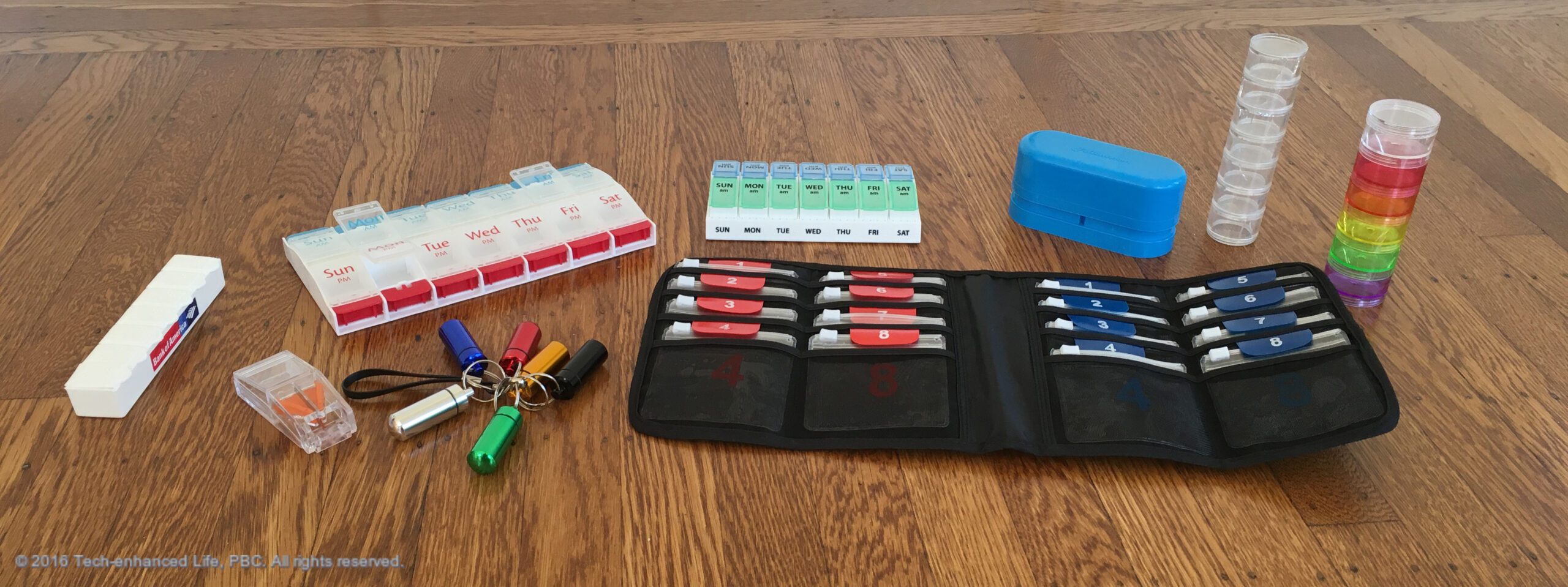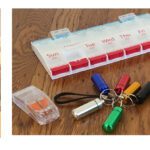By: Editorial Team | Posted: September 7, 2016 | Updated: March 22, 2023
Learn what older adults themselves think about the challenges of medication management.
The Voices of Older Adults: Managing Medications
There has been a lot written about medication management for older adults. But it is rare to hear from older adults themselves.
In this synthesis of explorer discussions, you can hear medication management tips and perspectives from the older adult Longevity Explorers themselves, and learn how they approach managing medications — including what they care about and what they don’t like.
For this exploration, five separate groups of Longevity Explorers talked about their medication regimens across several months of serial explorations. Part of the conversation was just comparing notes about each individual’s approach to managing medications. Part was a hands-on, show and tell of pill organizers and pill boxes each explorer used. And inevitably the discussions included whether or not the explorer felt a need for “better” solutions, or whether they were happy with the solutions they had today.
Listen to these discussions to learn about topics such as:
- how these older adults manage their medications today;
- what products they prefer to use (pill boxes, pill reminders, and the like), and why; and
- what if any challenges they experience in day to day managing of various drug regimens; and
- the aspects of medication management our explorers actually care about (hint, there are some surprises here for most clinicians and developers).
Listen to the Medication Management Discussions
The discussions were very rich, and we are not going to summarize them in detail here. Please listen to the audio recordings of the actual discussions, which are listed in the sidebar (big screen) or at bottom (tablet or smartphone). You need to login to listen to the discussions.
Key Medication Management Take-aways
Here are some of the key things we learned. Although it is important to note that there were widely diverging points of view from different discussion participants, depending on things like where they lived and with whom, and on the details of their medication regimen.
Diverse personalized mnemonics
Each explorer had their own mnemonic and their own approach to organizing their medications. Many took advantage of one or other type of pill organizer. But they differed a lot in which exact pill box they liked best. There is more on this below.
General lack of perceived “problem”
Most explorers felt that taking the right pills and medicines at the right time was very important, and that it was something to which they paid serious attention. They all had a personal routine of one sort or the other, some of which were quite complex.
Interestingly, with a few exceptions, most of these older adults felt like they had the problem under control, and that there was not a need for “better” medication management tools — at least not for them.
Cognitive Impairment and Dementia
Many of the explorers commented that for those with cognitive impairment, things would get much more tricky. It seemed clear that many of the home-grown memory aids these explorers used would breakdown for someone with cognitive impairment. So these discussions should not be taken as relevant to the scenario of medication adherence in those with dementia, since that is a quite different demographic.
Medication Adherence: Structured Exploration
In one of the explorations, a group of explorers from the San Francisco Village focused on a series of specific questions, posed by a researcher interested in real world answers to commonly debated issues relating to medication adherence. This is a “must-listen” discussion for those who are product developers, or researchers interested in medication management or medication adherence.
Medication Adherence Questions
The questions this group discusses are:
- How do you store your medicines? [How do you make sure that you can find your medicines? Do you make a difference between the ‘daily medicines’ and the ones ‘used once in a while’?]
- How do you decide on a daily regimen? [Which tablets/pills to take first, which ones before/during/after food, which ones at the same time? Did you write this down somewhere? Did your pharmacist(s) help? Did you manage it through experience and trial-and-error?]
- How do you take your medicines if you leave your house for a day? How do you pack it? What do you actually take? (the bottle, the blister pack, the whole box?)
- How do you make sure that you don’t forget? [What is ‘best practice for not forgetting’? What would be an ideal way to support?]
- What do you do when you realize that some medicines are not taken? [Call a doctor? Contact a pharmacist? Just ignore and continue? Blame somebody else?]
Hear the answers to these questions, from this group of older adults in their 70’s, 80’s and 90’s: Older Adult Perspectives on Medication Adherence.
Pill Organizers
A major feature of everyone’s approach to keeping on top of their pills and medicines was some type of organizer.
Most of the pill organizers discussed in the audio recordings are included in the image shown at the top of this page. Each time one of our explorers brought along a pill box and commented positively about it, we sought it out and added it to our “collection” for subsequent show and tell interactions. Most but not all can be found on Amazon.
The pill organizers discussed by these groups of older adults (typically in their 70’s and 80’s) are all relatively simple. In contrast, healthcare companies and clinicians tend to be interested in a much more complex family of products, with features like locking compartments, automatic dispensing, and automated reminders. It was striking that, at least for these groups of older adults, such products were seen as complete overkill, and suitable only “for someone else”!
There were surprisingly divergent opinions on which pill organizer people preferred. As with many of the other product categories we have explored, it seems that different life situations and different persona types lead to a different answer to “which is the best pill organizer for me?”
Need a Pill Box or Pill Organizer?
See which Pill Boxes and Organizers our Longevity Explorers recommend.
More on Managing Medication from Tech-enhanced Life
More Complex Medication Adherence Solutions.
Most of our explorers want simple and inexpensive solutions to their medication management challenges. But there are some challenges, that require more complex solutions.
For example, any of these situations probably needs something more complex than the simple pill organizers above.
-
Polypharmacy: when you have lots and lots of medications to keep track of. For example, if you have 10 different medications it becomes very complex to keep track of what to take and when to take it;
-
Time critical medications: if you are taking blood thinners, some antibiotics, or other medications that have to be taken at specific times or in specific situations;
- Cognitive impairment: if you, or some you care about, has trouble remembering things.
For an in depth overview of the different types of medication management systems, ranging from simple pill organizers to complicated automatic pill dispensers read:
Technology for Managing Medication (for Dementia Patients)
The speakers cover what is out there, the pluses and minuses of various approaches to managing medication in the context of dementia, and some unmet needs. The focus of the talk is on medication management for dementia.
Pill Reminder App Evaluation
In some related work, we have created this piece of research analyzing pill reminder apps (and other medication managing and reminding apps for the smartphone). If you are looking for a good way to be reminded when it is time to take your pills or other medication:
Medication Management Topic Hub
To see all our research relating to medication management, visit our Medication Management Topic Hub:
Visit our Medication Management Topic Hub.
*Disclosure: The research and opinions in this article are those of the author, and may or may not reflect the official views of Tech-enhanced Life.
If you use the links on this website when you buy products we write about, we may earn commissions from qualifying purchases as an Amazon Associate or other affiliate program participant. This does not affect the price you pay. We use the (modest) income to help fund our research.
In some cases, when we evaluate products and services, we ask the vendor to loan us the products we review (so we don’t need to buy them). Beyond the above, Tech-enhanced Life has no financial interest in any products or services discussed here, and this article is not sponsored by the vendor or any third party. See How we Fund our Work.


Medication review
There are always comments about seniors managing their medications.
My advice is to confer with your doctor and go over your list of everything you’re taking regardless of who prescribed it, as well as over the counter products that commonly have little or no benefit.
It is common to continue taking medications after the need has passed, or to be taking duplicative meds from different physicians.
Keep it as simple as possible.
Although I am a physician my input comes from my wife, a hospice nurse, who shows me stunningly long lists of medications some people take.